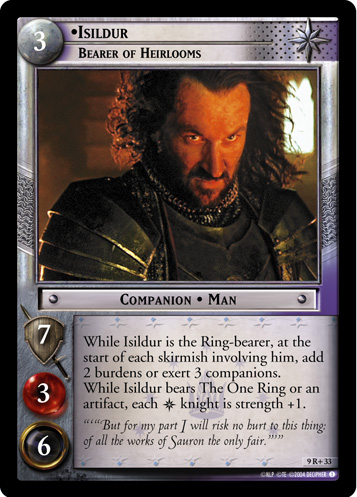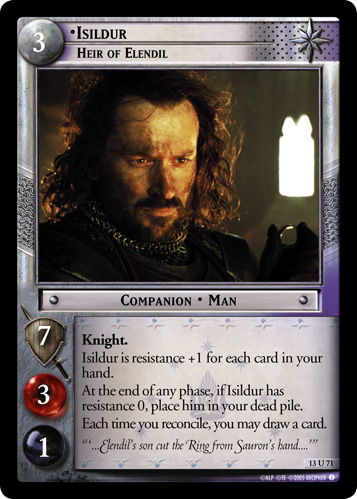Isildur, Sword-Bearer (18R54)
Back to Treachery & Deceit Index |
Ranger of the North (18R55) |
Isildur, Sword-Bearer (18R54) is a Gondor Companion from the Treachery & Deceit set.
| ||||||||||||||||||||||||
| ||||||||||||||||||||||||
| ||||||||||||||||||||||||
Strategy[edit]
Isildur, Sword-Bearer is an effective healing companion, possessing the ability to heal anyone in the fellowship whenever he wins a skirmish, although he comes with a matching penalty of an exertion each time he loses a skirmish. Sword-Bearer is a fairly cheap companion, costing only 2 twilight for his 7 strength and 3 vitality, which makes him easy to play in starting fellowships. His healing is also very versatile, as it can heal any companion in the game, without any culture restrictions.
Sword-Bearer's healing ability can be very useful for fellowships, providing heals for exertion-based abilities (Such as Merry, Friend to Sam or Watcher at Sarn Ford), mitigating damage dealt by archery or simply making up for skirmish losses. Sword-Bearer can be combined with Kings' Legacy and even Banner of Westernesse, providing up to 3 heals for each skirmish victory.
The knight status of Isildur gives him easy synergy with various fortification strategies, and makes his ability even easier to manipulate, as combinations like Fourth Level + Gondor Bow can easily win him skirmishes. His healing is also very welcome for knight decks, as most of them require many exertions to fuel cards like Sixth Level and Stone Tower.
While Sword-Bearer's penalty can be threatening if allowed to get out of hand, it can generally be dealt with by only assigning Isildur to skirmishes he can confidently win, while skirmish losses can be assigned to other members of the fellowship. Additionally, being an exertion, it can't kill a member of the fellowship on its own, although it is important to consider skirmish order when using Isildur.
In addition to his skirmish penalty, Sword-Bearer also boasts a pitifully low resistance, and lacks any kind of game text to boost it (Unlike Isildur, Heir of Elendil). This makes him particularly vulnerable to resistance punishing effects, such as Neekerbreekers' Bog, Archer of Harad or Ulaire Cantea, Black Assassin.
Strengths and Weaknesses[edit]
Strong Versus...[edit]
- Low strength minions
- Archery/Wounding decks
Weak Versus...[edit]
- Resistance-!Hate
- Fierce minions
- High strength minions
Rulings[edit]
- When Isildur wins or loses a skirmish, the Free Peoples player may choose to resolve his text before or after resolving skirmish damage.
Alternate Personas[edit]
| Portrait | Name | Game Text |
|---|---|---|
Isildur, Bearer of Heirlooms (9R+33)

|
While Isildur is the Ring-bearer, at the start of each skirmish involving him, add 2 burdens or exert 3 companions.
While Isildur bears The One Ring or an artifact, each | |
Isildur, Heir of Elendil (13U71)

|
Knight.
Isildur is resistance +1 for each card in your hand. At the end of any phase, if Isildur has resistance 0, place him in your dead pile. Each time you reconcile, you may draw a card. |
See Also[edit]
Decks[edit]
- Expanded Format: Gondor/Evil Men Archery - http://lotrtcgwiki.com/forums/index.php/topic,8522.0.html
- Standard Format: Kings' Legacy/Uruk Hunters - http://lotrtcgwiki.com/forums/index.php/topic,4251.0.html


